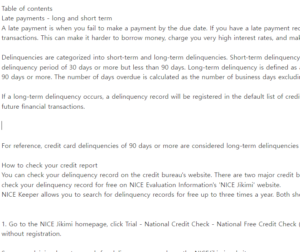If you don’t pay your credit card or cell phone bill on time, you’ll end up with a late payment record. In today’s world, credit is everything, so it’s great to have a clean record, but it’s a lot of inconvenience if your credit rating goes down or you can’t get financial services because of a late payment. Let’s take a look at how to get rid of late payments on credit cards, cell phone bills, utilities, and taxes that you forgot to pay, and when to remove them. 닥터규의 정보도서관
Table of contents
Late payments – long and short term
A late payment is when you fail to make a payment by the due date. If you have a late payment record, your credit rating will decrease and you will be penalized for financial transactions. This can make it harder to borrow money, charge you very high interest rates, and make it harder to get credit cards with reduced limits.
Delinquencies are categorized into short-term and long-term delinquencies. Short-term delinquency is defined as an overdue amount of 300,000 won or more and a delinquency period of 30 days or more but less than 90 days. Long-term delinquency is defined as a delinquent amount of KRW 1 million or more and a delinquent period of 90 days or more. The number of days overdue is calculated as the number of business days excluding holidays.
If a long-term delinquency occurs, a delinquency record will be registered in the default list of credit reporting agencies and credit bureaus, and you will be disadvantaged in future financial transactions.

For reference, credit card delinquencies of 90 days or more are considered long-term delinquencies and will be registered as bad credit.
How to check your credit report
You can check your delinquency record on the credit bureau’s website. There are two major credit bureaus in Korea, NICE and AllCredit. In this article, I will introduce how to check your delinquency record for free on NICE Evaluation Information’s ‘NICE Jikimi’ website.
NICE Keeper allows you to search for delinquency records for free up to three times a year. Both short-term and long-term delinquency records are searched.
1. Go to the NICE Jikimi homepage, click Trial – National Credit Check – National Free Credit Check (non-members), and then click the Apply for Service button. You can search without registration.
Screen explaining how to search for delinquency records on the NICEJikimi website
NICEJikimi delinquency record inquiry screen
2. After agreeing to the required consent items such as consent to provide personal information, proceed to authenticate your identity.
NICEJikimi Delinquency Record Inquiry Identity Verification Screen
Required consent items and identity verification for delinquency record inquiry
3. After verifying your identity, you can check the delinquency record inquiry result.
NICEJikimi Delinquency Record Search Result Screen
Delinquency record search result
The method of searching in All Credit is not much different from the method of searching in NICE KeepMe, and you can search for delinquency records as a non-member.
When to Delete Delinquent Records
The delinquency record does not remain forever. The delinquency record will be deleted from the day the delinquency information is removed by paying off all delinquent amounts, and the delinquency record will be deleted depending on the amount and number of cases. Although we refer to a delinquency as being removed, what we really mean is that the delinquency remains, but is not shared with credit bureaus and lenders. In other words, the delinquency remains, but is not reflected on your credit report after the delinquency is removed.
Table showing when to remove a late payment history and its impact on credit ratings by late payment amount, days past due, and number of late payments
When to remove a late payment by amount and time period
For reference, delinquencies related to taxes, such as national and local taxes and penalties, will result in a decrease in your credit rating regardless of the number of days of delinquency if you are overdue by more than KRW 5 million or have three or more delinquencies in a year, and will remain on your delinquency record for five years after payment.
Improving your credit rating after deleting a delinquency record
Removing a delinquency will not immediately improve your credit score – your past delinquencies have already contributed to your credit score when the delinquency occurred, so removing the delinquency will not in itself improve your credit score. Think of it as a “we’re not judging you based on your past history”.
This is because your credit rating is evaluated based on your comprehensive financial transactions, such as faithful repayment of loans and stable income. Therefore, in order to improve your credit rating, you should basically not have any delinquencies in various utilities, taxes, credit cards, and telecommunication bills, and if you have loans, it is recommended that you pay them faithfully.